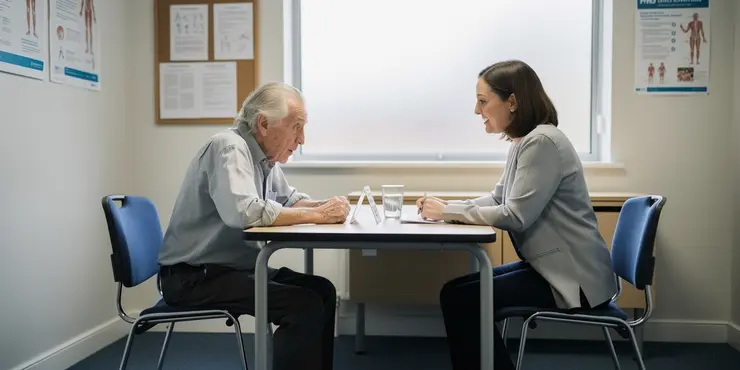
Find Help
More Items From Ergsy search
-
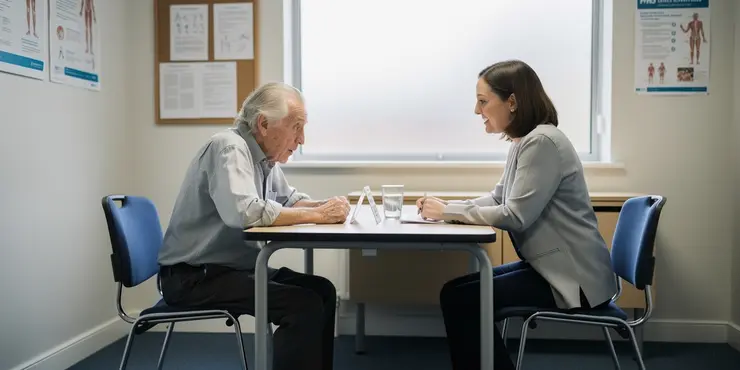
How does motor neurone disease impact swallowing?
Relevance: 100%
-

What is motor neurone disease?
Relevance: 95%
-
Are there different types of motor neurone disease?
Relevance: 91%
-

What are the primary symptoms of motor neurone disease?
Relevance: 88%
-
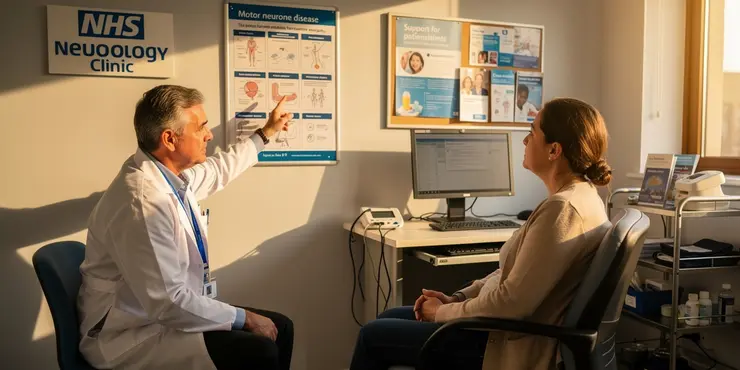
Is there a cure for motor neurone disease?
Relevance: 86%
-
Is motor neurone disease hereditary?
Relevance: 84%
-

What causes motor neurone disease?
Relevance: 82%
-

What treatments are available for motor neurone disease?
Relevance: 82%
-
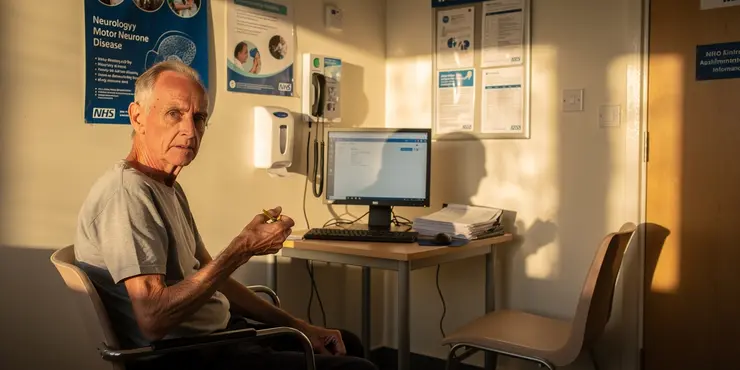
How does motor neurone disease affect the body?
Relevance: 79%
-

How is motor neurone disease diagnosed?
Relevance: 77%
-
How does motor neurone disease affect speech?
Relevance: 73%
-

How is breathing affected by motor neurone disease?
Relevance: 73%
-

Motor neurone disease Julie's story | NHS
Relevance: 72%
-
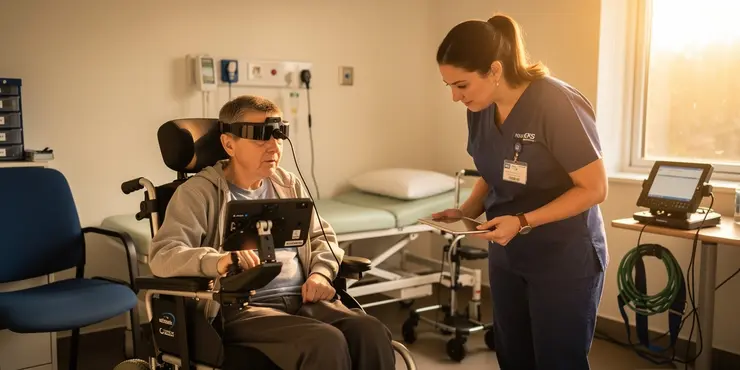
What assistive devices can help people with motor neurone disease?
Relevance: 72%
-

What role do genetics play in motor neurone disease?
Relevance: 71%
-
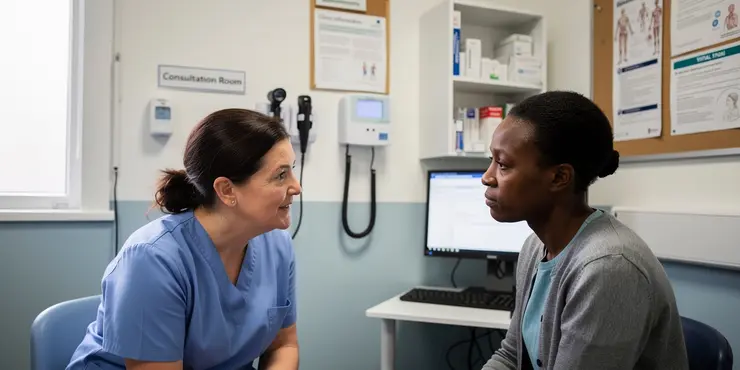
What is the life expectancy after a motor neurone disease diagnosis?
Relevance: 69%
-
Can lifestyle changes impact motor neurone disease progression?
Relevance: 66%
-

How can caregivers support someone with motor neurone disease?
Relevance: 64%
-

Voice banking service helps people live with motor neurone disease
Relevance: 63%
-

Are there support groups for individuals with motor neurone disease?
Relevance: 59%
-
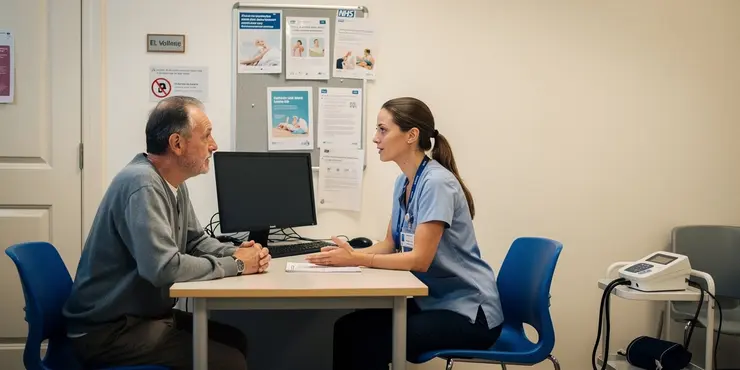
Who is at risk for motor neurone disease?
Relevance: 54%
-
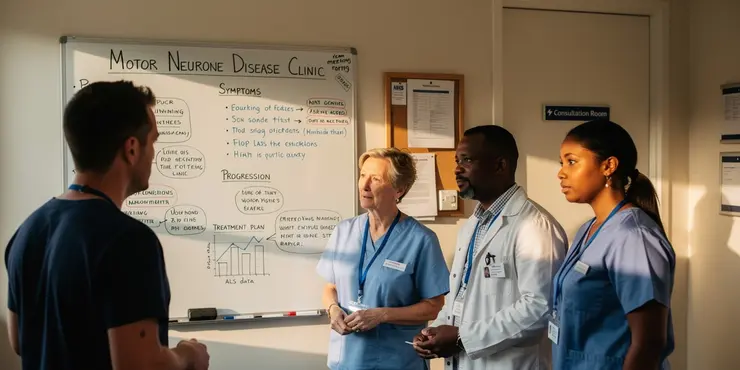
What research is being done on motor neurone disease?
Relevance: 53%
-

Swallowing awareness - dysphagia
Relevance: 41%
-
How does Huntington's disease affect movement?
Relevance: 38%
-
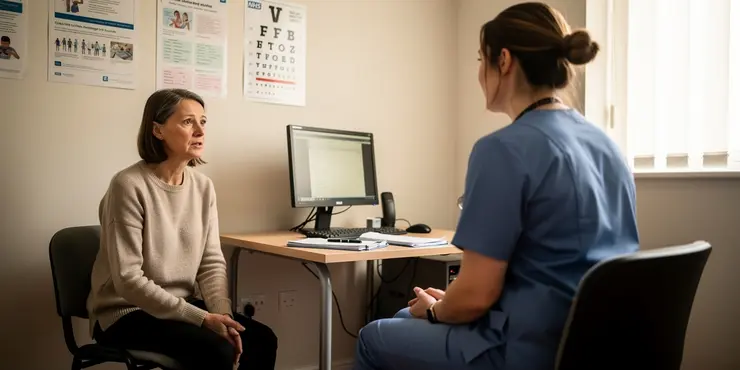
What are the symptoms of Huntington's disease?
Relevance: 37%
-

What is MND?
Relevance: 35%
-
Problems swallowing pills: Lean forward technique | NHS
Relevance: 33%
-

Problems swallowing pills: Pop bottle technique | NHS
Relevance: 33%
-
What is Parkinson's disease?
Relevance: 32%
-
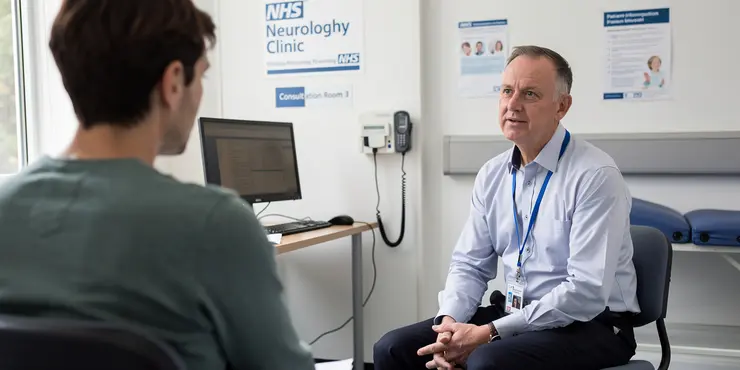
What kinds of specialists are involved in treating Huntington's disease?
Relevance: 30%
-
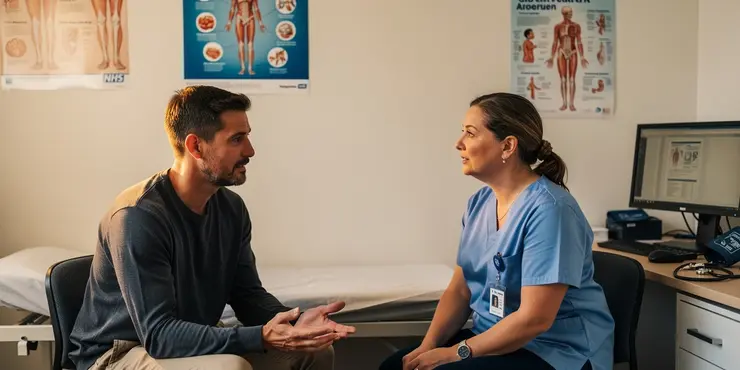
What causes Huntington's disease?
Relevance: 30%
-

Is Huntington's disease fatal?
Relevance: 29%
-
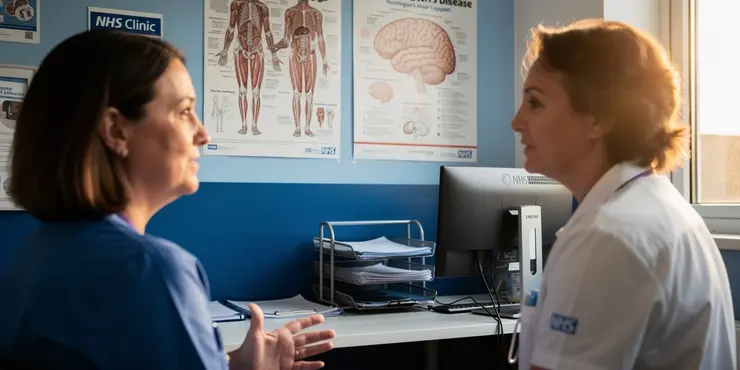
What is Huntington's disease?
Relevance: 27%
-
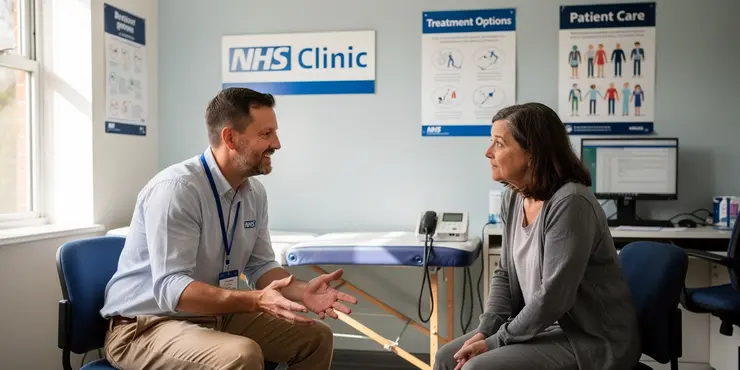
What research is being done on Huntington's disease?
Relevance: 26%
-

Can Huntington's disease be prevented?
Relevance: 25%
-

What causes Alzheimer's disease?
Relevance: 25%
-

What are the stages of Alzheimer's disease?
Relevance: 24%
-
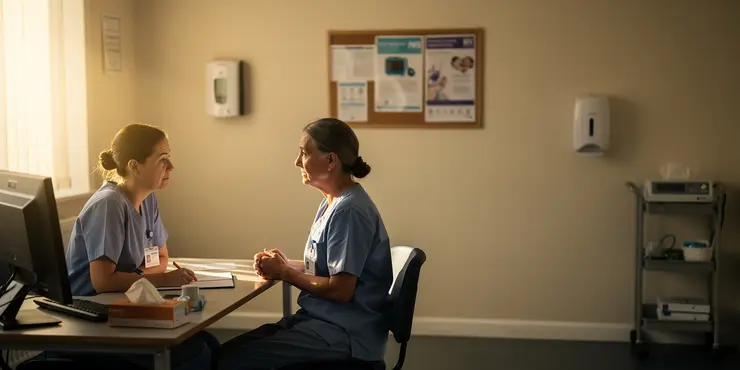
Can Huntington's disease be cured?
Relevance: 22%
-

How is Huntington's disease diagnosed?
Relevance: 21%
-

Charlie and Rupert on their journey with Spinal Muscular Atrophy and Zolgensma Gene Therapy
Relevance: 21%
Understanding Motor Neurone Disease
Motor neurone disease (MND) is a progressive neurological condition that affects the nerves, known as motor neurones, in the brain and spinal cord. These nerves are responsible for controlling voluntary muscle activities in the body, such as walking, speaking, and swallowing. As the disease progresses, symptoms worsen, leading to increased difficulty in performing these basic functions.
The Impact on Swallowing
Swallowing, or dysphagia, is a common and significant challenge faced by individuals with MND. The process of swallowing is complex, involving the coordination of various muscles in the mouth, throat, and esophagus. When MND affects the motor neurones controlling these muscles, it leads to weakness and deterioration, making swallowing difficult and sometimes dangerous.
Mechanism of Swallowing Difficulty
In a healthy individual, swallowing involves the smooth coordination of multiple muscle groups, enabling food and liquid to move safely from the mouth to the stomach. In people with MND, the progressive degeneration of motor neurones disrupts this coordination, leading to difficulties in managing food within the mouth, trouble initiating a swallow, and problems with the movement of food through the esophagus.
Potential Complications
Swallowing difficulties in MND can result in several serious health complications. One of the main risks is aspiration, where food or liquid accidentally enters the airway and lungs, potentially leading to pneumonia. Malnutrition and dehydration are also significant concerns, as affected individuals may find it challenging to consume adequate nutrition due to swallowing difficulties.
Strategies for Managing Swallowing Issues
Managing swallowing difficulties in MND involves a multidisciplinary approach. Speech and language therapists play a crucial role in assessing the extent of the problem and advising on techniques and exercises to improve swallowing efficiency. Nutritional adaptations, such as modifying food textures and using thickening agents for liquids, can help reduce the risk of choking and aspiration.
In some cases, where swallowing becomes extremely difficult, alternative feeding methods like a feeding tube may be recommended to ensure the person receives adequate nutrition and hydration. A gastrostomy tube is commonly used, allowing direct delivery of nutrition to the stomach, bypassing the need for oral intake.
Support and Resources
Living with MND and its associated swallowing difficulties poses significant challenges. However, support and resources are available through the NHS and organisations such as the Motor Neurone Disease Association (MNDA) in the UK. These organisations offer practical advice, information, and support for individuals with MND and their families, helping them manage symptoms and maintain quality of life.
Understanding Motor Neurone Disease
Motor neurone disease, or MND, is a sickness that affects the nerves in our brain and spinal cord. These nerves help us move muscles that we control, like when we walk, talk, or swallow. Over time, MND makes these movements harder to do.
The Impact on Swallowing
Swallowing is often hard for people with MND. Swallowing uses many muscles in our mouth and throat. With MND, these muscles get weak, making it tough and sometimes unsafe to swallow.
How Swallowing Gets Hard
When we swallow, many muscles work together to move food from our mouth to our stomach. In people with MND, the nerves that help these muscles work get damaged. This makes it tough to manage food in the mouth, start swallowing, and move food down to the stomach.
Possible Problems
Trouble swallowing can lead to serious health issues. Food or drink might go into the lungs by mistake, causing lung infections. It can also be hard to eat and drink enough, leading to weight loss and dehydration.
How to Help Swallowing Problems
Helping with swallowing problems in MND needs a team of experts. Speech therapists can offer exercises to help swallow better. Changing the way foods are prepared, like making them softer or drinks thicker, can prevent choking.
If swallowing becomes too hard, a feeding tube might be needed. This tube goes straight to the stomach to make sure the person gets enough food and water.
Support and Resources
Living with MND is challenging, but there is help. The NHS and groups like the Motor Neurone Disease Association (MNDA) in the UK offer advice and support. They can help people with MND and their families manage symptoms and live better.
Frequently Asked Questions
What is motor neurone disease (MND)?
Motor neurone disease is a progressive neurological disorder that affects the nerve cells responsible for controlling voluntary muscles, leading to muscle weakness and atrophy.
How does MND affect swallowing?
MND can weaken the muscles involved in swallowing, leading to dysphagia, which is difficulty or discomfort in swallowing.
What are the signs of swallowing difficulties in MND patients?
Signs include coughing or choking during meals, food sticking in the throat, unintentional weight loss, and recurrent chest infections.
Why is swallowing affected in MND?
Swallowing is affected because MND damages the motor neurons that control the swallowing muscles, reducing their function.
Can swallowing difficulties in MND lead to other health complications?
Yes, they can lead to malnutrition, dehydration, and aspiration pneumonia as food or liquid enters the lungs.
How is swallowing assessment conducted for MND patients?
A speech and language therapist typically conducts the assessment, examining how the patient swallows different textures and liquids.
What interventions are available for swallowing problems in MND?
Interventions include dietary modifications, swallowing therapies, and sometimes the use of feeding tubes.
What dietary changes can help MND patients with swallowing difficulties?
Dietary changes may include pureeing foods, thickening liquids, and eating smaller, more frequent meals.
How does a feeding tube help MND patients with swallowing issues?
A feeding tube can provide nutrition directly to the stomach, bypassing the need to swallow and reducing the risk of aspiration.
Is the use of a feeding tube permanent for MND patients?
The use of feeding tubes can be temporary or permanent, depending on the patient's condition and needs.
Can medications help improve swallowing in MND?
While no medications can reverse swallowing difficulties, some drugs may help manage related symptoms like excessive saliva.
What role do speech and language therapists play in managing swallowing problems?
They assess swallowing function, recommend strategies to improve safety and efficiency, and provide exercises to strengthen swallowing muscles.
How can family members support MND patients with swallowing difficulties?
Family members can assist by preparing appropriate meals, ensuring a safe eating environment, and helping with feeding if necessary.
Are there any devices to aid swallowing for MND patients?
Certain devices, like chin straps or specialized drinking cups, can help manage swallowing issues and reduce the risk of choking.
Can physical therapy help with swallowing issues in MND?
While physical therapy focuses on general muscle strength, it may be less effective for the specific muscles involved in swallowing. Speech therapy is more targeted.
How quickly can swallowing difficulties progress in MND?
The progression varies; some individuals experience gradual changes while others may notice rapid decline.
Are there exercises to improve swallowing in MND patients?
Yes, specific swallowing exercises prescribed by a therapist can improve muscle coordination and safety while eating.
What environmental changes can help MND patients with swallowing difficulties?
Creating a calm environment, ensuring proper seating posture, and allowing ample time for meals can assist in safer eating.
Do all MND patients experience swallowing difficulties?
Not all MND patients will have swallowing difficulties, as it depends on the type and progression of the disease.
What is the importance of early intervention for swallowing problems in MND?
Early intervention can help manage symptoms, reduce complications, and maintain quality of life for as long as possible.
What is motor neurone disease?
Motor neurone disease (MND) is an illness that affects the brain and nerves. It makes muscles weak and can make it hard for someone to move, talk, or breathe. To help understand or remember, you can: - Use pictures or videos about MND. - Ask someone to explain it with easy words. - Use a computer app that reads out the text.Motor neurone disease is a sickness that gets worse over time. It hurts the nerve cells that help you move your muscles when you want to. This makes your muscles weak and smaller.
How does MND affect swallowing?
MND, or Motor Neurone Disease, makes it hard to swallow. This happens because the muscles used for swallowing become weaker.
When the muscles are weak, food or drink can go down the wrong way. This can cause coughing or choking.
Sometimes, people might find it hard to eat enough, because swallowing is difficult.
Here are some things that can help:
- Eat soft foods that are easy to swallow.
- Drink thick drinks like smoothies.
- Try to eat slowly and take small bites.
- Ask a speech and language therapist for help. They can show you safe ways to swallow.
MND can make the muscles weak. This can make swallowing hard. This problem is called dysphagia. It means having trouble or feeling uncomfortable when swallowing.
What signs show swallowing problems in people with MND?
People with MND might find it hard to swallow.
Look for these signs:
- Coughing when eating or drinking
- Food or drink coming out of the mouth
- Takes a long time to eat or drink
- Hard to breathe while eating
- Losing weight
Ask for help:
- Use a straw for drinks
- Cut food into small pieces
- Try softer foods
- Get advice from a doctor
Here are some signs to look for: coughing or choking when eating, feeling like food is stuck in the throat, losing weight without trying, and getting chest infections a lot.
If you have trouble understanding, you can ask a family member for help or use a reading app to read aloud. It might also help to break down each sign into smaller, simple ideas.
Why is swallowing hard in MND?
MND, or Motor Neurone Disease, can make swallowing hard. This is because MND affects the nerves that help muscles work. These muscles are important for swallowing.
Here are some ways to help:
- Eat soft foods. They are easier to swallow.
- Take small bites and chew well.
- Use special cups or straws to drink safely.
- Ask a speech therapist for tips. They can teach you how to swallow better.
- If swallowing is very hard, talk to a doctor for more help.
Remember, you are not alone. Asking for help is a good thing to do.
MND can make swallowing hard. This happens because it hurts the nerves that help your swallowing muscles work. When these nerves don't work well, the muscles don't either.
Can trouble swallowing in MND cause other health problems?
Yes, this can make people very sick. They might not get enough food or water. They could also get a lung infection if food or drink goes into their lungs instead of their stomach.
How do doctors check swallowing for people with MND?
Doctors need to see how people with MND swallow food and drinks. Here is how they do it:
1. **Talk to you**: They will ask questions about any problems you have with swallowing.
2. **Watch you swallow**: They will watch you eat and drink. This helps them see if you have trouble swallowing.
3. **Special X-ray**: Sometimes, doctors might use an X-ray. You will swallow food or drink that shows up on the X-ray. This helps doctors see how you swallow inside your body.
Tools to help:
- You might use different cups or straws to make swallowing easier.
- A speech therapist can help you practice swallowing safely.
A speech and language therapist helps understand how someone swallows. They look at how a person swallows different foods and drinks.
What can help someone with MND who has trouble swallowing?
There are different ways to help. These include changing what you eat, learning how to swallow better, and sometimes using special tubes to help you eat.
How can people with MND eat better if they have trouble swallowing?
If someone with MND has a hard time swallowing, here are some tips:
- Softer Foods: Try to eat foods that are soft and easy to chew, like mashed potatoes or yogurt.
- Smaller Pieces: Cut food into small pieces so it’s easier to eat.
- Thicker Drinks: Use special powders to make drinks thicker. This helps stop choking.
- Eat Slowly: Take your time and eat slowly. Chew your food well.
- Sit Up: Always sit up straight when eating or drinking.
- Ask for Help: Talk to a doctor or a speech therapist. They can give you more tips.
We can change the food and drinks we have to make swallowing easier. We can mash up food, make drinks thicker, and eat smaller meals more often.
Here are some tips to help:
- Use a blender to mash food.
- Add special powder to thicken drinks.
- Try eating 5 or 6 small meals a day instead of 3 big ones.
How does a feeding tube help people with MND who can't swallow?
A feeding tube helps people eat when it's hard to swallow.
Here's how it helps:
- The tube goes into the stomach. It gives food straight to the body.
- People get the food they need without swallowing.
Support tools can make it easier:
- Ask a doctor or nurse for help.
- Use pictures or videos to understand how it works.
A feeding tube helps to eat and drink. It gives food straight to the stomach. This means you don't have to swallow. It also helps to stop choking.
Do people with MND always need a feeding tube?
Sometimes people with MND have trouble eating or drinking. A feeding tube can help. This does not mean they will need it forever.
Doctors and carers will help decide what is best. They often check to see if a person can eat or drink safely.
Using a feeding tube can make life easier and more comfortable.
Talking with a doctor or a nurse can help answer questions. You can also ask for more support if needed.
Feeding tubes can be used for a short time or forever. It depends on what the person needs and how they are feeling.
Can medicine help people with MND swallow better?
There are no medicines that can fix swallowing problems. But some medicines might help with other things like too much saliva.
How do speech and language therapists help with swallowing problems?
Speech and language therapists are people who help others talk and swallow better. They work with people who have trouble swallowing food or drinks. They help make eating safer and easier.
They use special exercises and techniques to make swallowing better. This can stop choking and coughing when eating. They might also suggest different foods or drinks that are easier to swallow.
Tools like picture cards or videos can help people understand what to do. Friends, family, and carers can learn these tips to help too.
They check how well you can swallow, suggest ways to make it safer and easier, and give you exercises to make your swallowing muscles stronger.
How can family members help people with MND who have trouble swallowing?
When someone has MND, they might find it hard to swallow food and drinks. Family can help by:
- Making soft or blended foods that are easy to eat.
- Helping them sit up straight when eating or drinking.
- Giving drinks that are thicker, like smoothies or milkshakes, to make swallowing easier.
Using these tips can make eating and drinking safer and more comfortable for your loved one.
Family members can help by making the right meals, keeping the eating area safe, and helping to feed if needed.
Are there tools to help MND patients with swallowing?
People with MND may have trouble swallowing food or drinks. There are tools that can help. Here are some ideas:
- Special Cups or Straws: These can make drinking easier.
- Food Thickeners: These make drinks thicker so they are safer to swallow.
- Swallowing Exercises: A doctor or therapist can show you some exercises to help.
If you or someone you know has MND and needs help with swallowing, talk to a doctor or speech therapist. They can suggest what might be best.
Some things can help make swallowing easier. You can use a chin strap or special cups to help you drink safely and stop choking.
Can physical therapy help with swallowing problems in MND?
MND stands for Motor Neurone Disease. Sometimes, people with MND find it hard to swallow food or drinks.
Physical therapy can help. Physical therapists show gentle exercises that might make swallowing easier.
If you or someone you know has trouble swallowing, ask a physical therapist for advice.
Tools like special cups or spoons might also make swallowing easier.
Physical therapy helps make your body strong. But it might not help much with swallowing. Speech therapy is better for swallowing.
How fast can swallowing problems get worse in MND?
The way things change can be different for everyone. Some people notice small changes over time. Other people might see big changes happen quickly.
Can exercises help people with MND swallow better?
Some exercises can help people with MND swallow. MND is a disease that makes it hard to move muscles.
Here are some tips:
- Repeat simple swallowing exercises.
- Try to swallow slowly and carefully.
- Talk to a speech therapist. They can help with special exercises.
- Use easy-to-swallow foods and drinks.
Getting help from family or friends can also make swallowing safer and easier.
Yes, doing special exercises for swallowing can help. A therapist can give you these exercises. They help your muscles work better so you can eat safely.
What can help people with MND when they have trouble swallowing?
Here are some simple things that can help:
- Use a cup with a spout or a straw to make drinking easier.
- Make sure the person is sitting up straight when eating or drinking.
- Cut food into small pieces and chew it well.
- Eat slowly and take small bites.
- Use soft foods like yogurt or soup.
- A speech therapist can help with special tips.
There are tools and people who can help. Don't be afraid to ask!
It helps to eat safely if you keep the place quiet, sit up straight, and take your time with your meals.
Do all people with MND have trouble swallowing?
Not everyone with MND finds it hard to swallow.
MND affects everyone in different ways.
If you have trouble, a speech therapist can help.
Try softer foods or liquids if it's hard to swallow.
Ask doctors for help if you are worried.
Some people with MND might have trouble swallowing, but not everyone will. It depends on what kind of MND they have and how it affects them.
Why is it important to get help early for swallowing problems in MND?
Getting help early can make things better. It can help with symptoms, stop problems, and keep life good for a long time.
Useful Links
This website offers general information and is not a substitute for professional advice.
Always seek guidance from qualified professionals.
If you have any medical concerns or need urgent help, contact a healthcare professional or emergency services immediately.
Some of this content was generated with AI assistance. We’ve done our best to keep it accurate, helpful, and human-friendly.
- Ergsy carfully checks the information in the videos we provide here.
- Videos shown by Youtube after a video has completed, have NOT been reviewed by ERGSY.
- To view, click the arrow in centre of video.
- Most of the videos you find here will have subtitles and/or closed captions available.
- You may need to turn these on, and choose your preferred language.
- Go to the video you'd like to watch.
- If closed captions (CC) are available, settings will be visible on the bottom right of the video player.
- To turn on Captions, click settings .
- To turn off Captions, click settings again.
More Items From Ergsy search
-

How does motor neurone disease impact swallowing?
Relevance: 100%
-

What is motor neurone disease?
Relevance: 95%
-
Are there different types of motor neurone disease?
Relevance: 91%
-

What are the primary symptoms of motor neurone disease?
Relevance: 88%
-

Is there a cure for motor neurone disease?
Relevance: 86%
-
Is motor neurone disease hereditary?
Relevance: 84%
-

What causes motor neurone disease?
Relevance: 82%
-

What treatments are available for motor neurone disease?
Relevance: 82%
-

How does motor neurone disease affect the body?
Relevance: 79%
-

How is motor neurone disease diagnosed?
Relevance: 77%
-
How does motor neurone disease affect speech?
Relevance: 73%
-

How is breathing affected by motor neurone disease?
Relevance: 73%
-

Motor neurone disease Julie's story | NHS
Relevance: 72%
-

What assistive devices can help people with motor neurone disease?
Relevance: 72%
-

What role do genetics play in motor neurone disease?
Relevance: 71%
-

What is the life expectancy after a motor neurone disease diagnosis?
Relevance: 69%
-
Can lifestyle changes impact motor neurone disease progression?
Relevance: 66%
-

How can caregivers support someone with motor neurone disease?
Relevance: 64%
-

Voice banking service helps people live with motor neurone disease
Relevance: 63%
-

Are there support groups for individuals with motor neurone disease?
Relevance: 59%
-

Who is at risk for motor neurone disease?
Relevance: 54%
-

What research is being done on motor neurone disease?
Relevance: 53%
-

Swallowing awareness - dysphagia
Relevance: 41%
-
How does Huntington's disease affect movement?
Relevance: 38%
-

What are the symptoms of Huntington's disease?
Relevance: 37%
-

What is MND?
Relevance: 35%
-
Problems swallowing pills: Lean forward technique | NHS
Relevance: 33%
-

Problems swallowing pills: Pop bottle technique | NHS
Relevance: 33%
-
What is Parkinson's disease?
Relevance: 32%
-

What kinds of specialists are involved in treating Huntington's disease?
Relevance: 30%
-

What causes Huntington's disease?
Relevance: 30%
-

Is Huntington's disease fatal?
Relevance: 29%
-

What is Huntington's disease?
Relevance: 27%
-

What research is being done on Huntington's disease?
Relevance: 26%
-

Can Huntington's disease be prevented?
Relevance: 25%
-

What causes Alzheimer's disease?
Relevance: 25%
-

What are the stages of Alzheimer's disease?
Relevance: 24%
-

Can Huntington's disease be cured?
Relevance: 22%
-

How is Huntington's disease diagnosed?
Relevance: 21%
-

Charlie and Rupert on their journey with Spinal Muscular Atrophy and Zolgensma Gene Therapy
Relevance: 21%


